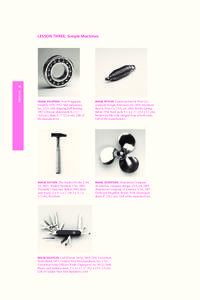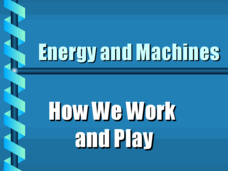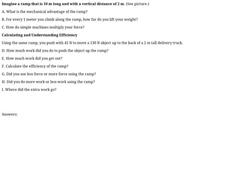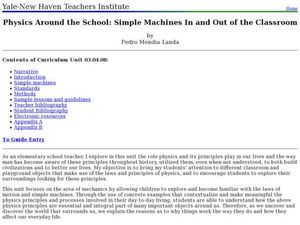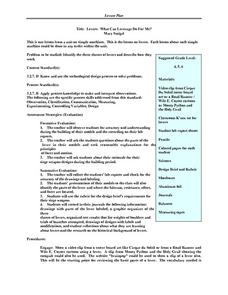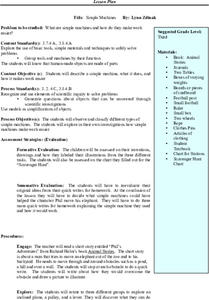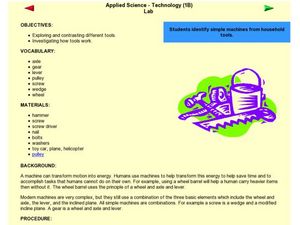Curated OER
Finding Simple Machines in Farm Machinery
Students identify simple machines and how they must work together to form a piece of equipment used in agriculture. They create a diagram of a piece of farm equipment and write about two of the simple machines they drew.
Curated OER
Qualitative Examples of Conservation of Mechanical Energy
Instructions for series of six activites, a reading of scientific literature, and a choice of six assessments await you in this physics resource. Well-written plans guide you in guiding your pupils to experiment with levers, pulleys,...
Curated OER
Simple Machines
Fifth graders study how simple machines can help us alter forces and discuss the term mechanical advantage. They then identify dysfunctional simple machines and discuss in groups how the dysfunctions will decrease the effectiveness of each.
Curated OER
Simple Machines
Young scholars design objects in the Museum of Modern Art's collection of simple machines. In this simple machines lesson, students explore the machine age in the MoMA's design collection. Young scholars identify simple machines and the...
Curated OER
Energy and Machines: How We Work and Play
Energy and machines are two things that belong together. This resource provides a clear and simple overview of energy, force, work, and machines. Because the information in this presentation is clear and well-organized it would...
Curated OER
Build Working Models With household Items
Students follow the illustration, and cut out foam board according to the pattern. They assemble the small parts by gluing. Once the glue is dry, students tape the end of the bottom and top clipper boards, they slide toothpicks through...
Curated OER
Simple Machines IV - Wheels and Axles
Fourth graders study everyday examples of simple machines. They examine how the combination of a wheel and axle works more efficiently than either in isolation. In a demonstration lesson, they see how a spring scale shows a force pulling...
Curated OER
The Time Machine
Challenge your class with this instructional activity! Learners read The Time Machine by H.G. Wells, discuss context clues, identify main ideas and details, and analyze story elements. Discussion questions and activities are broken down...
Curated OER
Work and Efficiency
In this doing work worksheet, students calculate how a ramp can increase the efficiency of the work done by decreasing the force necessary to complete the task. This worksheet has 9 problems to solve.
Curated OER
Simple Machines
In this science worksheet, students focus upon the concept of bicycle gears and develop the answers to the 2 questions at the bottom of the page.
Curated OER
Physics Around the School: Simple Machines In and Out of the Classroom
Learners explore different machines and the components that encompass the science of physics. In this physics lesson plan students explore how things move.
Curated OER
Simple Machines
First graders discuss work, force, and energy. They study how work is done. Students discuss various types of work that are done. They act out how work is done. Student draw pictures of types of work they have done.
Curated OER
Farming 1: Farming Machines
Second graders explore different farm machines. In this farm lesson, 2nd graders discover the importance of farmers, and crops. Students discuss healthy eating and how crops are packaged. Students read books about farms and how bread is...
Curated OER
Round and Round--Wheels and Axles
In this wheels and axles worksheet, students read a 1 page article, make a list of how many objects they can find or think if that uses a wheel or axle and then design their own machine.
Curated OER
Levers: What Can Leverage Do For Me?
Students determine the identity of the three classes of levers while explaining how each works. They wait a video clip that shows uses for different types of levers and work as a class to write a KWL chart. Finally, they make a model fo...
Teach Engineering
Machines and Tools (Part 2)
Which pulley system will give us a whale of a good time? Teams compare the theoretical and actual mechanical advantages of different pulley systems. They then form a recommendation for how to move a whale from an aquarium back to the ocean.
NOAA
Invent a Robot!
Wait til your class gets their hands on this! Aspiring engineers design a working robotic arm in the fifth and final installment in a series of ocean exploration lessons. Pupils learn about the use of underwater robots in ocean...
Curated OER
Simple Machines
Third graders listen to a short story entitled, "Phil's Adventures" from a book called Animal Stories. They stop at each obstacle in the story and do a quick write about how they would overcome the obstacle and draw a picture to...
Curated OER
Simple Machines/Technology
Third graders examine the concept of work as the movement of an object through a distance. They define gravity and determine what type of work is caused by gravity. They measure how far an object is moved by a force. They make a...
Curated OER
Move It!
Third graders examine simple machines. In this simple machines lesson, 3rd graders observe simple machines at work in a video, then experiment with creating their own simple machines to move objects.
Curated OER
Rube Rube
Students examine and discuss simple machines and Rube Goldberg cartoons, listing real-world examples. They design and illustrate a Rube Goldberg device, identify the simple machines involved, and write a paragraph explaining how the...
Curated OER
Gadget Anatomy
Fifth graders examine and identify different simple machines that make up complex machines. They analyze and discuss different gadgets and appliances brought in from home, then in small groups examine one of the machines in detail. ...
Curated OER
Connection to Social Studies-The Pyramids
In this simple machines worksheet, students read about the pyramids and the simple machines used to build them. They answer three critical thinking questions about the building of the pyramids.
Curated OER
Household Tools
Students explore parts of a system. In this simple machines lesson plan, students discover that simple machines are composed of two or more systems. Students examine household tools and assess the parts of the system.





